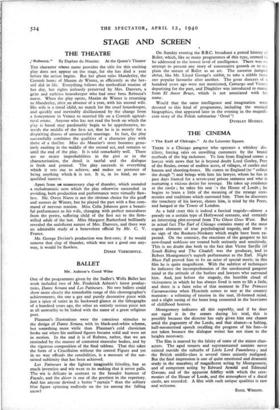BALLET
Mr. Ashton's Good Wine
ONE of the programmes given by the Sadler's Wells Ballet last week included two of Mr. Frederick Ashton's latest produc- tions, Dante Sonata and Les Patineurs. No two ballets could show more clearly the remarkable range of this choreographer's achievements; the one a gay and purely decorative piece with just a spice of satire in its backward glance at the lithographs of a hundred years ago, the other an entirely serious piece not at all unworthy to be linked with the name of a great religious poet.
Flaxman's illustrations were the conscious stimulus to the design of Dante Sonata, with its black-and-white scheme, but something more virile than Flaxman's cold classicism broke out when his outlined figures became solid and were set in motion. In the end it is of Rubens, rather, that we are reminded by the masses of contorted muscular bodies, and by the vigorous composition of the final tableau. That this takes the form of a Crucifixion without the central Figure and yet in no way offends the sensibilities, is a measure of the sus- tained sublimity that has been achieved.
Les Patineurs is the lightest imaginable frivolity, but so much invention and wit went to its making that it never palls. The wit is delicate in contrast to the broader humour of Facade, and the decor is one of the prettiest in the repertory. And has anyone devised a better " curtain " than the solitary blue figure spinning endlessly on the ice among the falling snow? On Sunday evening the B.B.C. broadcast a potted history of Ballet, which, like so many programmes of this type, seemed to be addressed to the lowest level of intelligence. There was no attempt to present any story of consecutive growth or to plain the nature of Ballet as an art. The narrator jumped about, like Mr. Lloyd George's rabbit, to take a nibble from one popular favourite after another. The great dancers of a hundred years ago were not mentioned, Camargo and Vestris deputising for the past, and Diaghilev was introduced to music from El Amor Bruyo, which is not associated with his name.
Would that the same intelligence and imagination were devoted to this kind of programme, including the musical biographies, that appeared later in the evening in the magnifi- cent story of the Polish submarine Orsel '!
DYNELEY HUSSEY.


































 Previous page
Previous page